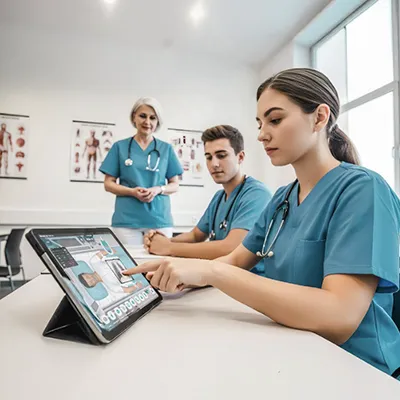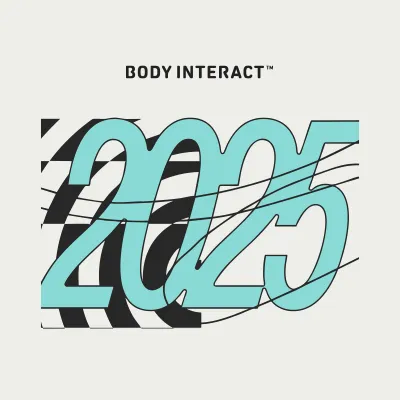IMSH Learning Lab based on Simulation-Based assessment
Body Interact was once again present at IMSH and this year prepared a learning lab based on Simulation-Based assessment. Brought together leading voices from across the globe to discuss their vision on how to use virtual patient simulation for assessment, the impact of simulation-based learning and assessment and to share their experience with Body Interact.
Speakers Highlight the Value of Simulation-Based Assessment

Sherria McDowell
Director of Special Programs
Patricia S. Levinson Center for Multicultural
and Community Affairs
Icahn School of Medicine at Mount Sinai
Office for Diversity and Inclusion
Mount Sinai Health System
USA
Our first speaker, Professor Sherria McDowell from Icahn School of Medicine at Mount Sinai, told us about how Body Interact incorporated a project for an improvement approach to Clinical Placements in the Height of the Covid-19 pandemic.
It was identified as a need for clinical case scenarios to supplement the lack of in-person clinical shadowing due to covid-19 pandemic. Body Interact as elected to incorporate this project at all level of programming with a total of 29 sessions for 2 hours.
Prof. Sherria recognizes Body Interact as a game-changer in clinical education, identifying its most significant benefits as follows
- Competency-based model: In a simulated setting, students develop advanced problem-solving and critical thinking abilities, fostering their skill development in a dynamic learning environment.
- Pre-defined scenarios: Save time and focus on student’s development and practical performance.
- Debriefing tools: Evaluate student’s behaviors and cognitive processes through comprehensive performance reports that extend beyond single scenarios, providing in depth analysis of their actions and thinking patterns.
- Versatility: It can be used anywhere. You can bring it to your classroom….
Versatility: It can be used anywhere. You can bring it to your classroom….
- Scenario content
- Safe learning environment
- Possibility to study anywhere and anytime
- Real-time feedback
- Prepares them to real world challenges
Additionally, it’s worth noting that Body Interact serves as an effective alternative to traditional paper cases, providing an innovative solution for delivering clinical scenarios.
Nowadays, Icahn School of Medicine at Mount Sinai and Nera MedPrep program has resumed in-person activity but it still uses Body Interact as a hybrid solution.

Jessy Escobar
Director of Educational Model
and New Technologies for Health Sciences
Vice Rectorate of Health Sciences
UNITEC and UVM, Laureate Group
Mexico
Professor Jessy Escobar from UNITEC and UVM in Mexico, shared her project to implement OSCEs with Virtual Patients in the Nursing Curriculum.
Previous In-person OSCE experience showed that it was a demanding task, involving detailed planning of both logistic and academic side and logistically challenged to do with a large number of students. Since the culture of simulation is already implemented in the curricula of the institution, Body Interact has proven to be a perfect ally.
With the main goal of assessing the clinical skills of students managing the patient in a holistic approach, a 14-week plan has been put in place and has shown to be effective. In this 14-week plan it is contemplated faculty preparation, student acknowledge, platform preparation, reminder for teachers and students, OSCE execution (remotely through Body interact), feedback and survey application.
Prof. Jessy enumerated the learned lessons with the implementation of this project:
- OSCE can be run remotely with the use of Virtual Patients
- OSCE motivates students to strengthen the areas of opportunity that they presented on the test
- Review and reinforcement the learning process in the nursing academy
Take the chance to read the full article on OSCE Implementation with Virtual Patients in the Nursing Curriculum by Professor Jessy Escobar

Brittany Maxwell
Assistant Professor of Nursing
Saint Elizabeth School of Nursing/University of Saint Francis
USA
Utilizing Body Interact for Nursing Clinical Judgment was Prof. Brittany Maxwell’s choice of presentation. St. Elizabeth School of Nursing started to use Body Interact also during the pandemic when clinical hours were suspense nevertheless, they still use it now. The licensure exam for Nurses has changed recently because research has showed that new graduate nursing has a lot of knowledge but they are struggling to apply it in a safe clinical setting and mistakes are being made. With Body Interact students can develop clinical judgment and decision-making skills. The available scenarios integrate essential elements of clinical judgment, empowering nurses to conduct holistic assessments, analyze several cues, and make confident decisions. Adding to the reason previous mentioned, for faculty member it is easy to use, it requires less turnover/preparation time compared with other simulation resources, its versatile and provides various scenarios.
St. Elizabeth School of Nursing, has integrated Body Interact in their curriculum through different teaching approaches. In the Classroom it has been used to explore and develop a case study and as projection to the all class. As for the clinical use, have chosen to use as makeup clinical assignment, assign to students to complete at home and in-house clinical combined with other simulation resources such as tasks trainer or high-fidelity manikins.
One advantage pointed by Prof. Brittany is the feedback feature that allows to create a debriefing session to further learning opportunities.
We understand the significance of debriefing in the learning process, and with Body Interact, we offer specific debriefing tools, that enable the creation of structured debriefing sessions to enhance learning opportunities.

Ichiro Kaneko
Director of the Simulation Education
and Research Center
Teikyo University
Japan
During his presentation, Professor Ichiro Kaneko of Teikyo University in Japan recounted an intriguing cross-cultural educational endeavor involving students from both Mexico and Japan, facilitated by the innovative platform Body Interact. Central to his discussion was the fundamental drive behind nurturing clinical communication skills among medical students. By emphasizing the intrinsic importance of effective communication in medical practice, Kaneko underscored the significance of honing these skills from the outset of a medical career.
In his closing remarks, Prof. Kaneko, shared the results of a survey applied to the students where 90,6% of the students showed to be satisfied with the achievement of communication skill in English and almost 100% were satisfied with Body Interact experience.

Chikako Kawahara
Associate Professor
Department of Medical Education
Showa University School of Medicine
Japan
In Showa University, Tokyo, Professor Chikako Kawahara had an important role in Body Interact implementation. At this moment it is used on the Nursing and Rehabilitation program from second to fourth year as a tool for team-based learning in acute care team approach for adult patients. Body Interact in these programs allows self-learning homework, Interprofessional group work and interprofessional task training. With this manner of use students have reported excellent outcomes and by using the Keller’s ARCS-Model Prof. Chikako has concluded that attention and relevance has increases since the application.
Body Interact’s continued presence at IMSH underscores its commitment to advancing simulation-based education. This year’s learning lab, centered on Simulation-Based Assessment, brought together leading voices from across the globe to explore the transformative potential of virtual patient simulation. Through insightful discussions and shared experiences, the speakers illuminated the profound impact of simulation-based learning and assessment in healthcare education.
As we reflect on the insights shared and the innovative approaches discussed, it’s evident that Body Interact stands at the forefront of revolutionizing medical education. By harnessing the power of virtual patients, Body Interact empowers educators and learners alike to engage in immersive, hands-on learning experiences that bridge the gap between theory and practice. As we look ahead, let us embrace the boundless possibilities offered by Body Interact and the transformative role of virtual patients in shaping the future of healthcare education.
Join us in embracing this exciting journey of discovery and transformation with Body Interact, where the future of medical education knows no bounds.
By Maria Carolina Ferreira – Customer Trainer / Registered Nurse









